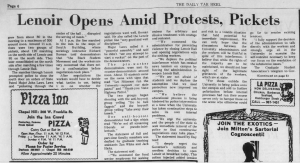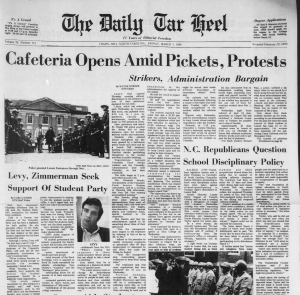This article from March 7, 1969 in The Daily Tar Heel describes the events surrounding the 1969 food workers’ strike at the University of North Carolina at Chapel Hill. In 1969, tensions were mounting as the Black Student Movement encouraged food workers at Lenoir Hall to protest their unfair wages. BSM was involved because the majority of Lenoir’s workers were black women.[1] The workers began to strike on February 23rd, calling for a twenty-cent pay raise to bring their hourly pay to $1.80. Most of Lenoir’s workers joined the strike, with approximately one-hundred forty joining and only ten to fifteen abstaining.
Three days prior to this article’s release, on March 4th, fights erupted in Lenoir after “white sympathizers of the [food] workers stalled the cafeteria lines.” University administration closed Lenoir the next day to avoid further violence and to allow for the administration to negotiate with the workers. However, Governor Bob Scott ordered Lenoir to be reopened, causing three-hundred pro-worker protestors to march on Lenoir. Scott sent in “over forty state patrolmen equipped for riot duty” and had the National Guard on standby in nearby Durham, inciting backlash against him. Two weeks later, the strike was resolved when the twenty-cent pay raise was agreed upon and implemented for all state employees.[2]
This particular article is of the utmost importance to understanding the food strike because it was written while the event was still developing by people who were in the very heart of it in Chapel Hill. The authors had to piece together what was happening and try to understand why the strike had erupted at that moment when the injustice had been occurring for many, many years.[3] The country’s eyes were on Chapel Hill at that moment, and The Daily Tar Heel was particularly insightful since it was written by students directly affected by the strike.
[1] Rome, David. “Planned Cafeteria Conversion Recalls 1969 Labor Strike.” The Daily Tar Heel, 29 Apr. 1982.
[2] Rome, David. “Planned Cafeteria Conversion Recalls 1969 Labor Strike.” The Daily Tar Heel, 29 Apr. 1982.
[3] The year 1969 was at the end of a decade focused on the Civil Rights Movement, thus the rights of minorities—and particularly African Americans, given the United States’ history of slavery—were at the forefront of politics. The UNC food workers’ strike is only a single example amongst a sea of protests across the country that illustrate the growing call for African Americans’ rights.

 Harder, Wayne. “Cafeteria Opens Amid Pickets, Protests.” The Daily Tar Heel, 7 Mar. 1969.
Harder, Wayne. “Cafeteria Opens Amid Pickets, Protests.” The Daily Tar Heel, 7 Mar. 1969.
-Sarah Cheeley
